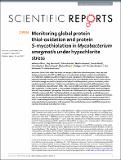| dc.contributor.author | Hillion, Melanie | |
| dc.contributor.author | Busche, Tobias | |
| dc.contributor.author | Rossius, Martina | |
| dc.contributor.author | Rawat, Mamta | |
| dc.contributor.author | Wirtz, Markus | |
| dc.contributor.author | Antelmann, Haike | |
| dc.contributor.author | Bernhardt, Jorg | |
| dc.contributor.author | Maas, Sandra | |
| dc.contributor.author | Becher, Dorte | |
| dc.contributor.author | Hell, Ruediger | |
| dc.contributor.author | Kalinowski, Jorn | |
| dc.contributor.author | Rueckert, Christian | |
| dc.date.accessioned | 2017-06-19T20:07:13Z | |
| dc.date.available | 2017-06-19T20:07:13Z | |
| dc.date.issued | 2017-04 | |
| dc.date.submitted | 2016-12 | |
| dc.identifier.issn | 2045-2322 | |
| dc.identifier.uri | http://hdl.handle.net/1721.1/110027 | |
| dc.description.abstract | Mycothiol (MSH) is the major low molecular weight (LMW) thiol in Actinomycetes. Here, we used shotgun proteomics, OxICAT and RNA-seq transcriptomics to analyse protein S-mycothiolation, reversible thiol-oxidations and their impact on gene expression in Mycobacterium smegmatis under hypochlorite stress. In total, 58 S-mycothiolated proteins were identified under NaOCl stress that are involved in energy metabolism, fatty acid and mycolic acid biosynthesis, protein translation, redox regulation and detoxification. Protein S-mycothiolation was accompanied by MSH depletion in the thiol-metabolome. Quantification of the redox state of 1098 Cys residues using OxICAT revealed that 381 Cys residues (33.6%) showed >10% increased oxidations under NaOCl stress, which overlapped with 40 S-mycothiolated Cys-peptides. The absence of MSH resulted in a higher basal oxidation level of 338 Cys residues (41.1%). The RseA and RshA anti-sigma factors and the Zur and NrdR repressors were identified as NaOCl-sensitive proteins and their oxidation resulted in an up-regulation of the SigH, SigE, Zur and NrdR regulons in the RNA-seq transcriptome. In conclusion, we show here that NaOCl stress causes widespread thiol-oxidation including protein S-mycothiolation resulting in induction of antioxidant defense mechanisms in M. smegmatis. Our results further reveal that MSH is important to maintain the reduced state of protein thiols. | en_US |
| dc.language.iso | en_US | |
| dc.publisher | Nature Publishing Group | en_US |
| dc.relation.isversionof | http://dx.doi.org/10.1038/s41598-017-01179-4 | en_US |
| dc.rights | Creative Commons Attribution 4.0 International License | en_US |
| dc.rights.uri | http://creativecommons.org/licenses/by/4.0/ | en_US |
| dc.source | Nature | en_US |
| dc.title | Monitoring global protein thiol-oxidation and protein S-mycothiolation in Mycobacterium smegmatis under hypochlorite stress | en_US |
| dc.type | Article | en_US |
| dc.identifier.citation | Hillion, Melanie; Bernhardt, Jörg; Busche, Tobias; Rossius, Martina; Maaß, Sandra; Becher, Dörte and Rawat, Mamta et al. “Monitoring Global Protein Thiol-Oxidation and Protein S-Mycothiolation in Mycobacterium Smegmatis Under Hypochlorite Stress.” Scientific Reports 7, no. 1 (April 2017): 1195 © 2017 Macmillan Publishers Limited, part of Springer Nature | en_US |
| dc.contributor.department | Massachusetts Institute of Technology. Department of Biology | en_US |
| dc.contributor.mitauthor | Rueckert, Christian | |
| dc.relation.journal | Scientific Reports | en_US |
| dc.eprint.version | Final published version | en_US |
| dc.type.uri | http://purl.org/eprint/type/JournalArticle | en_US |
| eprint.status | http://purl.org/eprint/status/PeerReviewed | en_US |
| dspace.orderedauthors | Hillion, Melanie; Bernhardt, Jörg; Busche, Tobias; Rossius, Martina; Maaß, Sandra; Becher, Dörte; Rawat, Mamta; Wirtz, Markus; Hell, Ruediger; Rueckert, Christian; Kalinowski, Jörn; Antelmann, Haike | en_US |
| dspace.embargo.terms | N | en_US |
| mit.license | PUBLISHER_CC | en_US |
